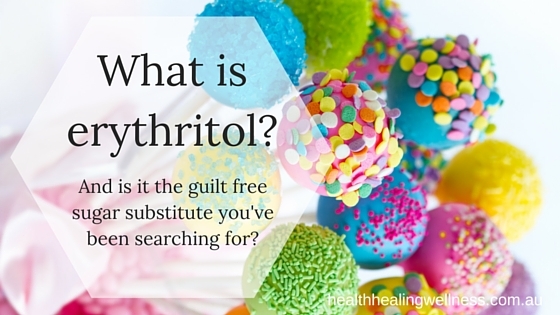
What is erythritol?
Published: May 04, 2016 Last Updated: January 21, 2024
What is erythritol? Erythritol is a polyol or sugar alcohol. (Although neither a sugar or an alcohol, it is a combination of sugar and alcohol molecules) The substance stimulates the sweet receptors on your tongue. Available in a granulated or powdered form, it looks and tastes quite like white sugar.
Erythritol may also be called - 968 or E968, Erythrite, Meso-erythritol, Tetrahydroxybutane
A few points on erythritol
- It has very low to zero calories
- It's not an artificial sweetener, considered a ‘natural sweetener’
- It is made from the fermentation of the natural sugars, often from corn
- Does not cause a spike in glucose levels like sugar etc
- As it cannot be metabolised by the bacteria in our mouths it doesn't cause tooth decay
- Contains no nutrients
- Our digestive system does not recognise erythritol, and as it's only partially absorbed, most of it is expelled.
- 60-80% as sweet as white sugar (or sucrose)
-
Extremely large doses may cause headaches, diarrhoea, cramps
Where is erythritol used?
This sugar alcohol can be found in many food products such as:
- chocolate
- candy or lollies
- chewing gum
- baked products like doughnuts
- foods labelled as ‘no sugar’ or ‘sugar-free’
- ice cream
- nutritional bars
- ‘natural’ table top sweeteners such as Truvia
- yoghurt
- beverages; including soft drinks and sports drinks
Erythritol is commonly used as a sweetener but can also be added to products as a humectant (to prevent food drying out), or to enhance flavour.
Erythritol may be used in food products in conjunction with other sweeteners, some of which are not as safe to consume or may cause a laxative effect so it is always important to read the product label and assess all the ingredients listed.
Erythritol may cause issues in those with IBS
The Low-FODMAP diet, aimed at those with IBS as well as those with fructose, gluten and lactose intolerances, advises avoiding foods containing polyols or sugar alcohols including erythritol.
The effect of erythritol can vary from person to person. Consult your health care provider before adding erythritol into your diet and seek medical advice if any side effects are experienced.
Natural healthy eating plan
If you would like expert advice on the best healthy eating plan for you , book a consultation to meet with our experienced Naturopaths . We take a holistic approach to your health investigating diet, lifestyle and environment factors to cater a specific plan for your individual needs.
Call our team on 3857 8887 or complete our consult request form today.

